Creating a custom workspace
Except for the LIVE workspace (i.e. the default TYPO3 CMS working environment), some custom workspaces must be created before anyone can start using the features described in this document.
By default a custom workspace contains three stages, which represent steps in the validation process: "editing", "ready to publish" and "publishing execute". Additional stages can be added.
To reach the following element you need to go to the root page (the one with the TYPO3 icon in the page browser), click on 'Create new record' and create a System Record of type 'Workspace'.
This chapter describes all properties of a workspace, as they appear in the editing form, grouped by tab.
General
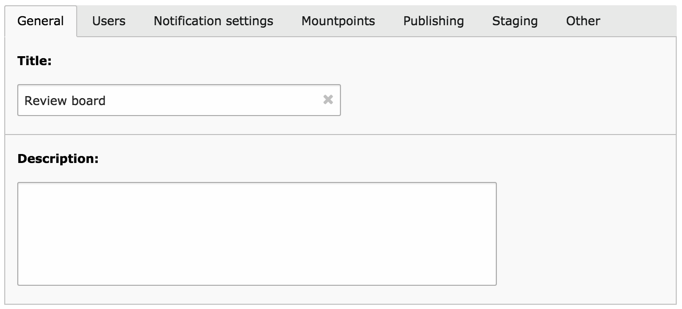
Entering the general information about the workspace
As with most records in the TYPO3 CMS universe, this is just about setting a clear title and a helpful description.
Users
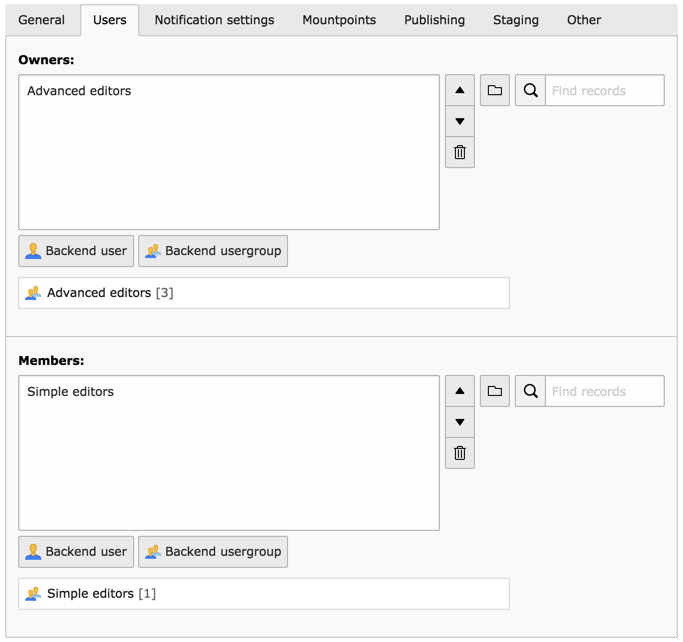
Setting up owners and members of the workspace
This tab is about setting up user permissions. The "Owners" have all possible rights over the workspace, including publication to live. "Members" also have all the rights, although they may be prevented from publishing with the "Only workspace owner can publish" setting (see the Other tab).
Note
As usual, it is recommended to work with groups rather than individual users. "Admin" users have access to all workspaces and all operations within workspaces.
Note
Users must be given explicit access to the LIVE workspace. This is done at the level backend users or backend groups.
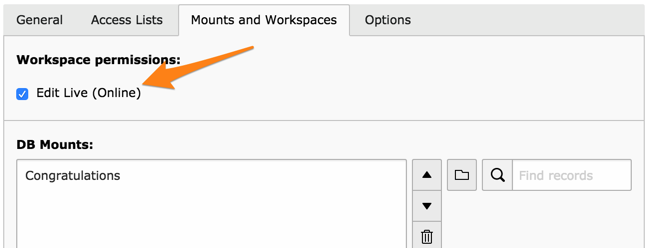
Giving access to the LIVE workspace to a backend group
Notification settings
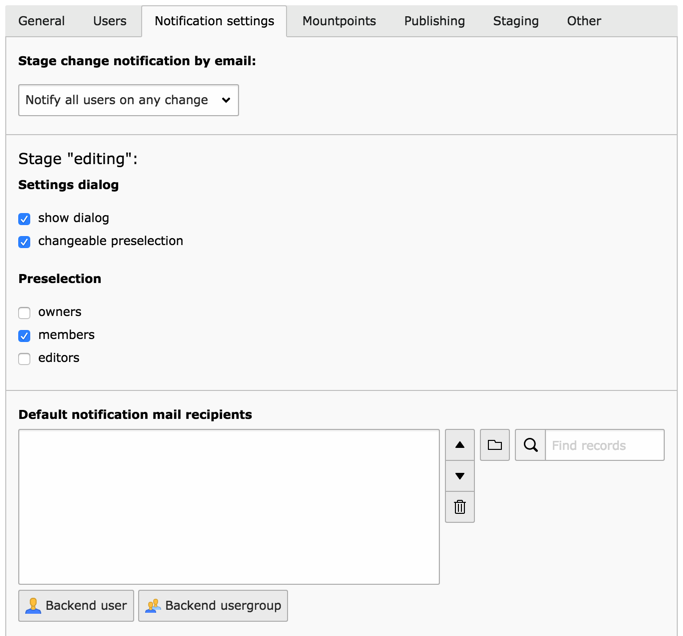
Fine-grained definition for the notification process
Each time a given change or set of changes moves from one stage to another (either forward or backward in the review process), people can be notified about this status change. This tab is about defining the behavior of the notification process.
With "Stage change notification by email" you can choose who gets notified. This can be either all users involved in the workspace (no matter the stage) or only the users involved with the stage the changes are being sent to.
Subsequently you can configure settings for the three predefined stages.
Note
The screenshot is cropped. The settings are the same for each stage.
The "Settings dialog" is about the popup window which appears after each review process. If the "show dialog" box is not checked, the popup will not show notification settings and notifications will be sent according to the predefined settings. When the "changeable preselection" box is checked, the preselected list of users to notify can be modified on the fly before sending the change notification.
The "Preselection" setting makes it possible to choose which users should be preselected by default in the notification popup. Furthermore specific users can be added to the list of notified people using the "Default notification mail recipients" field.
Mountpoints
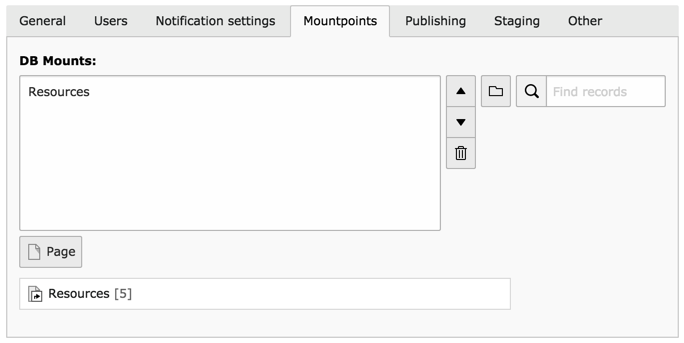
Setting alternate mountpoint for the workspace
A workspace can be restricted to one or more mountpoints. These need not be the same as the mountpoints from the users and groups that are allowed access to this workspace.
If no mountpoints are defined, the mountpoints from the users and the groups they belong to are used.
Publishing

Choosing a publication date for the custom workspace
If a "Publish" date is set, the content of the workspace will be automatically published on the given date. This requires the "Workspaces auto-publication" Scheduler task to be activated.
Note
Only the content which is "Ready to publish" is actually published.
Staging
Any number of custom stages can be created. Each corresponds to an additional step in the review process. Custom stages can be ordered at will. However they all come after the default "Editing" stage and before the default "Ready to publish" stage.
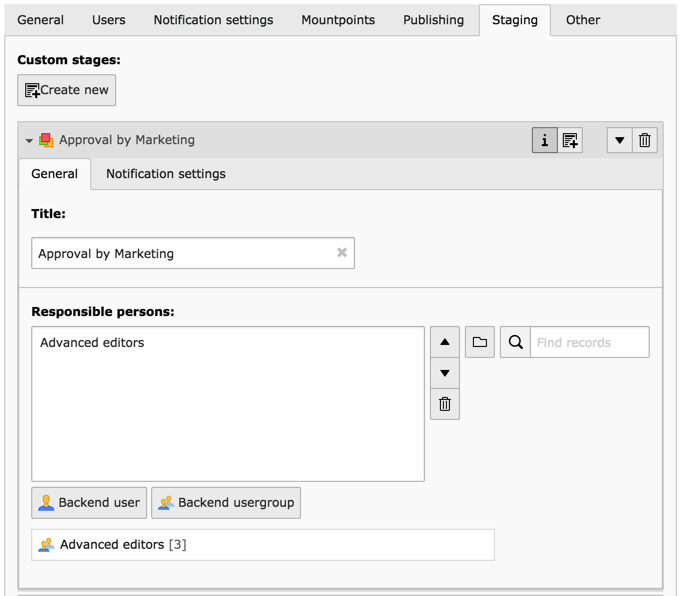
Setting the general information of a custom stage
In the "General" tab of a custom stage, a restricted set of users can be chosen from among "Owners" and "Members". They are called "Responsible persons".
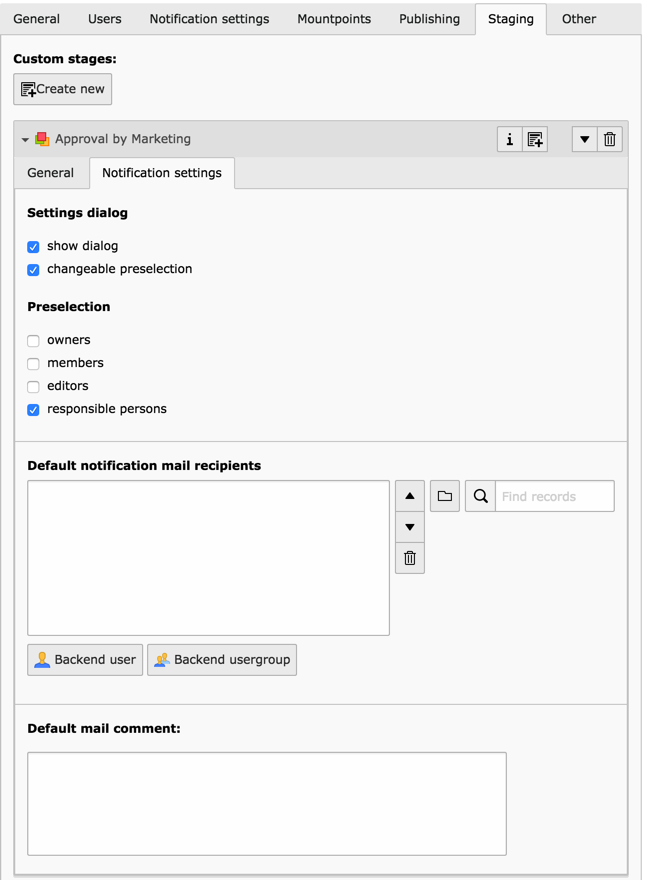
Defining the notification settings of a custom stage
The notification settings for a custom stage are mostly the same as for the default stages, except that the "Responsible persons" can also be chosen in the predefined list of users to notify and that a "Default mail comment" can be defined for that stage.
Note
In this context "Editors" means the people that have been involved in the change originally.
Other
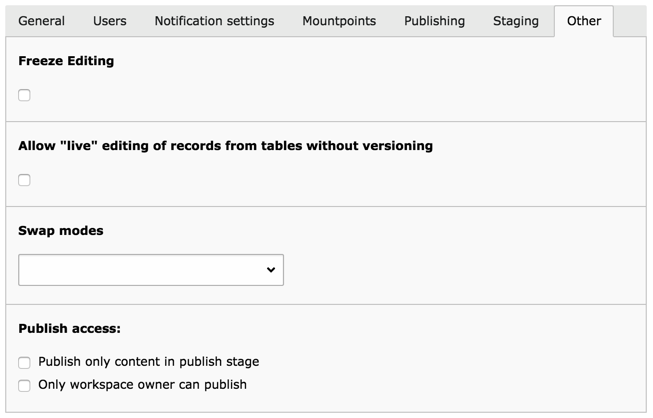
Miscellaneous settings for a custom workspace
The "Other" tab is comprised of various settings affecting the behavior of the custom workspace.
It is possible to allow editing of non-versionable records in the custom workspace. These records will be edited "live", i.e. any changes to them performed in the workspace will be directly visible on the web site, rather than going through the review process.
"Swap modes" defines if swapping should take place or not upon automatic publishing.
The "Publish access" setting further refines publishing rights. If the "Publish only content in publish stage" box is checked, modified content cannot be forcefully published by workspace owners at whatever stage. It has to reach the "Ready to publish" stage. Also publication can be restricted to the owners of the workspace (i.e. members may not publish).
